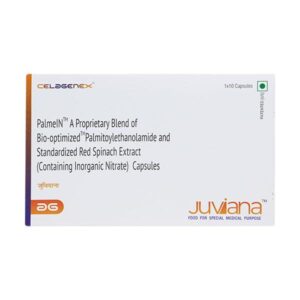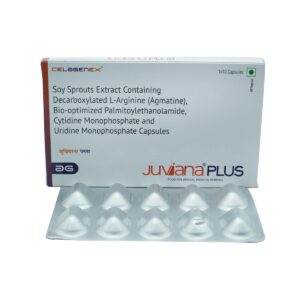PALMITOYLETHANOLAMIDE + CYTIDINE MONOPHOSPHATE
Palmitoylethanolamide: Palmitoylethanolamide (PEA) is a naturally occurring fatty acid amide that acts as an endogenous lipid mediator involved in regulating inflammation and pain. PEA has been widely studied for its potential therapeutic effects in various conditions, including chronic pain, neuropathic pain, and inflammation.
PEA exerts its effects by interacting with several targets in the body, including the peroxisome proliferator-activated receptor alpha (PPAR-α), which plays a role in modulating inflammation and pain pathways. By activating PPAR-α, PEA can reduce the release of pro-inflammatory substances and modulate immune responses, thereby exerting analgesic and anti-inflammatory effects.
PEA is available as a supplement and is typically taken orally. The recommended dose may vary depending on the condition being treated, but generally ranges from 300-1200 mg per day. It is often recommended to start with a lower dose and gradually increase if needed.
PEA is generally well-tolerated, and the side effects are minimal. Some reported side effects include mild gastrointestinal discomfort, nausea, and headache. However, these side effects are rare and typically resolve on their own without the need for intervention.
It is important to note that while PEA has shown promising results in various studies, more research is needed to fully understand its potential therapeutic effects and to determine the optimal dosing and treatment duration for specific conditions. As with any medication or supplement, it is recommended to consult with a healthcare professional before starting PEA or adjusting the dosage.
Cytidine Monophosphate: Cytidine Monophosphate (CMP) is a nucleotide derivative that plays an important role in various biochemical processes in the body. It is used as a dietary supplement and is also being studied for its potential therapeutic applications.
The exact mechanism of action of CMP is not fully understood, but it is believed to work by providing a source of nucleotides for the synthesis of RNA and DNA. It may also have neuroprotective effects and influence neurotransmitter synthesis in the brain.
CMP is available as an oral supplement and the recommended dose varies depending on the specific product. It is typically taken once daily, with or without food.
While CMP is generally considered safe, some individuals may experience side effects. Common side effects may include gastrointestinal discomfort, such as nausea, vomiting, or diarrhea. In rare cases, CMP may cause allergic reactions, which can manifest as rash, itching, or swelling.
As with any supplement or medication, it is important to consult with a healthcare professional before starting CMP to ensure it is appropriate for your individual needs and to discuss potential interactions with other medications or medical conditions.


